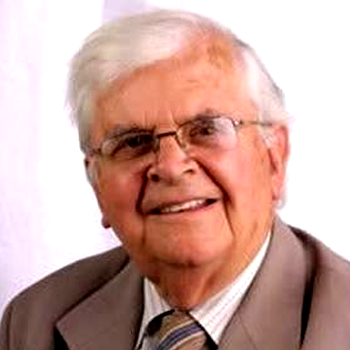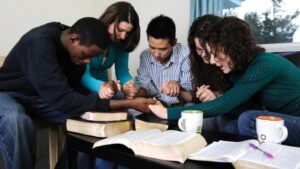Back to series



Prayer and Spiritual Friendship
At one of the breakout meetings of the National Prayer Breakfast, February 1, 2001, Congressman Mike Doyle testified to the transforming personal experience of prayer linked with new friendships. As a nominal Catholic of an Irish background, prayer was something he had associated with ‘church,’ not an intimately personal affair as it is expressed in friendship. But when he began to attend a weekly prayer meeting among members of both sides of the House, he discovered he could cultivate both friendship with God as well as with his colleagues, each mutually deepening and personalizing the other.
You, as well, may be discovering the same thing. Yet the discovery of the real meaning of divine and human friendship seems at first to be a radical event, strange indeed to the secular and alienating character of our contemporary society.
 In the classical ancient world, both aristocratic Greeks and Roman males viewed friendship as the most natural of human relationships. It was, indeed, the foundation of the Greek city state, and in the earlier period of the Roman empire it was the ‘glue’ that bound men, cities, and the world together. Aristotle in his Nicho-machean Ethics and Cicero in his De amicitia both emphasized the great worth of cultivating friendships.
In the classical ancient world, both aristocratic Greeks and Roman males viewed friendship as the most natural of human relationships. It was, indeed, the foundation of the Greek city state, and in the earlier period of the Roman empire it was the ‘glue’ that bound men, cities, and the world together. Aristotle in his Nicho-machean Ethics and Cicero in his De amicitia both emphasized the great worth of cultivating friendships.
All the classical schools argued that thought was meaningless without action, but action was meaningless without the fruition of friendships. In contrast, the thought of friendship with God and communication with Him in prayer to a self-assured Stoic like Seneca was thought to be a pointless exercise, since the cosmos was believed to be its own self-contained rationale.
But, the personal character of Yahweh in the Old Testament is described in such relational terms that when He speaks to Moses on Mount Sinai, it is “face to face, as a man speaks to a friend” (Exodus 33:11). Later, Jonathan’s devotion to David within the covenant life of Israel is portrayed as an image of selfless friendship.
It would seem, then, as Christian believers, that friendship and prayer should together be a natural expression of our humanity as well as our faith in the divine. Yet clearly they are not in our age and culture, especially in the political climate of a capital city like Washington, D.C. This short essay is intended to explore how the two can become conjoined as one living reality for us, each re-enforcing the other.
Today, even the most critical postmodern deconstructionist accepts the social nature of our humanity. Indeed, alterity or ‘otherness’ is the new buzz word, even when God is wholly denied. All agree on the social character of the human being, even if some like Jacques Lacan are very pessimistic about the fractured nature of the self in mimetic rivalry. Others like Emmanuel Levinas are more passionately ethical about ‘the Other’ in our relationships while inter-subjectivity has taken a leading role in contemporary therapy. Hopefully then, friendship may become re-instated once more in the renewed quest for genuine humanity.
Some evidence of this change in society is apparent. Despite the social breakdown of the family in our society, there is a compensatory growth in the significance of discipleship in the Christian community, i.e., the growing significance of mentors and those willing to be mentored. Even non-Christians are more aware of their spiritual lives, demonstrated in the drawing power of Zen and Yoga, the popularity of retreat centers, and the medical benefits of meditation. For Christians themselves, the theological renaissance of the doctrine of the Trinity, of three Persons in the Eternal Friendship of One God, should re-emphasize the central significance of personal relationships, human and divine. This may inspire many more Christians to take their prayer life as well as their friendships more seriously.
A hundred years of psycho-therapy has deepened people’s consciousness of our need to listen to one another. We are learning the importance of personal narrative, to appreciate the biographical context in which we can have mutual respect, understanding, kindness, and compassion. To live an unreflective, over-active, ‘normal Washington life’ is also deadening to self understanding, as well as to a deepened life of prayer. A spiritual friend is therefore needed, to awaken my heart out of the sleep of conventionalized, institutionalized, professional ways of our ‘normal existence,’ to so individuate me that I can take the first serious step in personal prayer. As Guerric of Igny, a twelfth century Cistercian has exhorted us in one of his Advent sermons: “The divine Word, coming and knocking at the door of our soul, challenges our indolence and arouses us from slumber. His desire is always to enter and make his home with us…Let your door stand open to receive Him, to lay bare the hidden recesses of your mind…Throw wide the gate of your heart.” Who better to help us do this than a soul friend who knows our blind-spots and who can encourage our confidences, to deepen as well as to enlarge our hearts? Prayer comes from the insights and the abundance of the heart, where we are free to disclose, to divest it of encumbrances, and to free it from its religious conventions and even its prejudices about God Himself. Then we may even discover that prayer has been pent up within us like an underground reservoir that can now gush forth like a spring of water into a desert environment. At least that was the experience of an ancient monk, who confessed: “Looking back, my impression was that I was carrying prayer within my heart but did not know it at the time.”
Our personality is a composite of the social expressions of our identity, which our friends recognize and have learned to accept about each of us. These are both positive and negative qualities that may encourage or impede our development of prayer, as well as of our personal growth. For prayer and personal growth belong together. They exhibit the consequences of our early childhood and our growing years, and help to explain the distortions and misunderstandings we may have of God, of how we pray, to whom we pray, or where we may be even blocked in our prayer life.
 How good, then, to have friends who understand these personal realities, and who are willing to facilitate our self-understanding before God, praying with Augustine, “Let me know Thee, O God, let me know myself, that is all!” Indeed personal prayer is like possessing ‘spiritual fingerprints,’ expressive of the uniqueness God has gifted to each of us, while at the same time freeing us of the relational bonds, or healing us of the personal wounds, we have received from others. This dual growth in prayerful intimacy with God, and of personal development, will, as a result, enlarge our friendships and also extend our walk with the Lord. This must be so, for prayer helps us to grow inwardly within ourselves, as well as upwardly with God, and outwardly with our friends.
How good, then, to have friends who understand these personal realities, and who are willing to facilitate our self-understanding before God, praying with Augustine, “Let me know Thee, O God, let me know myself, that is all!” Indeed personal prayer is like possessing ‘spiritual fingerprints,’ expressive of the uniqueness God has gifted to each of us, while at the same time freeing us of the relational bonds, or healing us of the personal wounds, we have received from others. This dual growth in prayerful intimacy with God, and of personal development, will, as a result, enlarge our friendships and also extend our walk with the Lord. This must be so, for prayer helps us to grow inwardly within ourselves, as well as upwardly with God, and outwardly with our friends.
Usually, we have too little confidence to express the desires of our heart. We may be too skeptical of an indifferent world outside, or too timid about our uniqueness inwardly, or too faithless about the character of God towards us as ‘the Father of lights,’ who, says the apostle James, ‘gives liberally.’ But, observes Augustine, “the desire of your heart is itself your prayer. And if the desire is constant so is your prayer. Not for nothing did the apostle tell us to pray without ceasing.” Unlike the Messalians who attempted to count how many times a day they prayed the Jesus prayer (“Lord Jesus Christ, Son of David have mercy on me”), “there is,” observes Augustine, “another, interior kind of prayer without ceasing, namely the desire of the heart…The constancy of your desire will itself be the ceaseless voice of your prayer. And that voice of your prayer will be silent only when your love ceases.”
Let, then, you and your spiritual accompanist in prayer be like two absorbed in the music, playing the piano together, each the complement of the other. But far more than musical melody is the desire of our hearts for God, the ceaseless longing for the One so worthy to be loved. For when our desire is for God, this holy desire educates and places all other desires in their proper places. As the apostle John tells us, “love is of God” (1 John 4:8), placing the companionship of God in prayer, and our human friendships in God, as the highest benefits we can ever enjoy. Prayer, then, is truly a school of love, where we learn to distinguish false from true love, and false desires from those that are truly of God. As Bernard of Clairvaux recognized so clearly, if love is of God, then all my seeking of God in prayer and through spiritual friendships are really the gracious evidences of God seeking me. “No one can seek You, unless He has already been found of You,” Bernard prayed. Our desire to pray, then, is already God’s gift of love and friendship to us.

James M. Houston
Professor, CSLI Co-Founder, Senior Fellow for Faith and Vocation, CSLI James M. Houston is a co-founder of the C.S. Lewis Institute. From its beginning, Jim has served as a Senior Fellow of the Institute, lecturing at CSLI events over the past four decades. He received his Bachelor of Science and M.A. degrees from the University of Edinburgh and a D. Phil. from Oxford University. He was a University Lecturer at Oxford from 1947 – 1971 where he taught cultural and historical geography. While teaching at Oxford, he met C.S. Lewis and participated in a regular Bible study with him for six years. He is known as one of the “founding fathers” of Regent College in Vancouver, British Columbia where he has served as the first Principal, Chancellor and Professor of Spiritual Theology.
 COPYRIGHT: This publication is published by C.S. Lewis Institute; 8001 Braddock Road, Suite 301; Springfield, VA 22151. Portions of the publication may be reproduced for noncommercial, local church or ministry use without prior permission. Electronic copies of the PDF files may be duplicated and transmitted via e-mail for personal and church use. Articles may not be modified without prior written permission of the Institute. For questions, contact the Institute: 703.914.5602 or email us.
COPYRIGHT: This publication is published by C.S. Lewis Institute; 8001 Braddock Road, Suite 301; Springfield, VA 22151. Portions of the publication may be reproduced for noncommercial, local church or ministry use without prior permission. Electronic copies of the PDF files may be duplicated and transmitted via e-mail for personal and church use. Articles may not be modified without prior written permission of the Institute. For questions, contact the Institute: 703.914.5602 or email us.
-
Recent Podcasts
Ralph Waldo Emerson’s Philosophy and Influence
by David George Moore on July 26, 2024Ralph Waldo Emerson was a gifted nineteenth century...Read More
-
The Side B Stories – Nate Sala’s Story
by Jana Harmon, Nate Sala on July 19, 2024
-
Terrorism Through the Eyes of Faith
by Dennis Hollinger on July 12, 2024
-
Recent Publications
Hasn’t Science Proven That Belief in God Is an Outdated Superstition?
by Sharon Dirckx on July 1, 2024Many assume that scientific practice and belief in...Read More
-
Has the Bible Been Corrupted as Some Muslims Claim?
by Andy Bannister on June 1, 2024
-
Seeing Jesus Through the Eyes of Women
by Rebecca McLaughlin on May 15, 2024
0
All Booked
0.00
All Booked
0.00
All Booked
22194
C.S. Lewis’s The Abolition of Man Live Online Small Group 8:00 PM ET
https://www.cslewisinstitute.org/?event=c-s-lewiss-the-abolition-of-man-study-course&event_date=2024-10-02®=1
https://www.paypal.com/cgi-bin/webscr
2024-10-02

Next coming event
Days
Hours
Minutes
Seconds
C.S. Lewis’s The Abolition of Man Live Online Small Group 8:00 PM ET
On October 2, 2024 at 8:00 pmSpeakers

James M. Houston
Professor, CSLI Co-Founder, Senior Fellow for Faith and Vocation, CSLI
Team Members

James M. Houston
Professor, CSLI Co-Founder, Senior Fellow for Faith and Vocation, CSLIJames M. Houston is a co-founder of the C.S. Lewis Institute. From its beginning, Jim has served as a Senior Fellow of the Institute, lecturing at CSLI events over the past four decades. He received his Bachelor of Science and M.A. degrees from the University of Edinburgh and a D. Phil. from Oxford University. He was a University Lecturer at Oxford from 1947 – 1971 where he taught cultural and historical geography. While teaching at Oxford, he met C.S. Lewis and participated in a regular Bible study with him for six years. He is known as one of the “founding fathers” of Regent College in Vancouver, British Columbia where he has served as the first Principal, Chancellor and Professor of Spiritual Theology.




